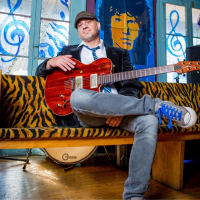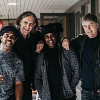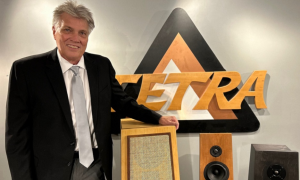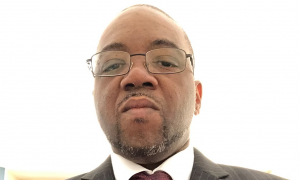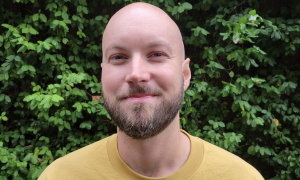Home » Jazz Articles » Chats with Cats » The Vinyl Collector: Chris Brown
The Vinyl Collector: Chris Brown
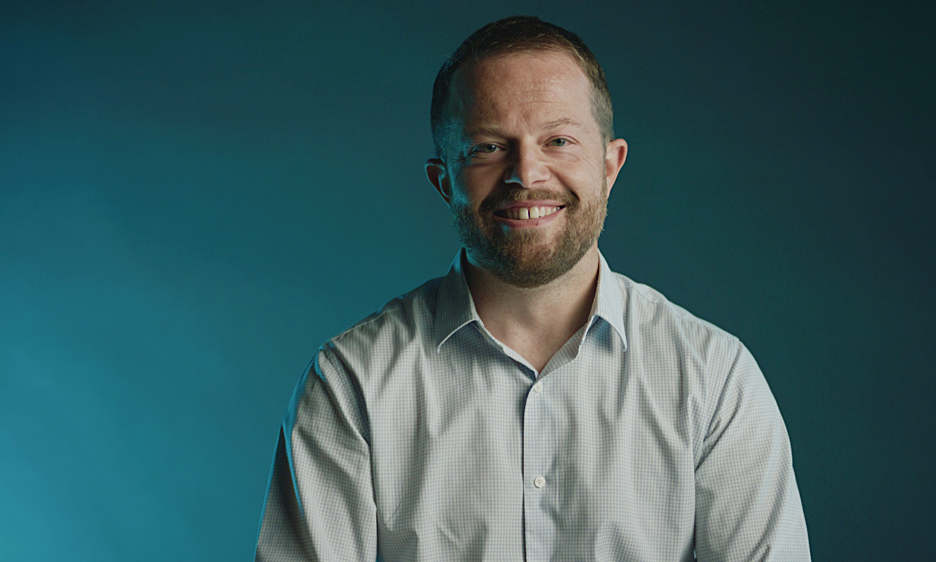
I can't get around this idea that there's a lot of people who are interested in exploring this music and I like being able to participate in that discovery.
—Chris Brown
In fashion, they call it the "twenty year cycle," where styles that were popular reappear decades later with a modern twist. I think many people in the business are enjoying this return to physical media at a time when the creation of the art itself seems to be an inevitable financial loss and the appreciation of the sonic artistry is getting lost through earbuds and phone speakers. But this comeback seems more lasting than just a fashion retread.
Also interesting is the culture surrounding this vinyl resurgence. We know that people will collect anything and there will always be an ecosystem that grows around these hobbyists. Chris Brown (A.K.A. What Can Brown) is one such collector and I spoke with him to get his take on recent trends. Besides being an avid listener, he is also very active on social media documenting his journey by articulately describing pieces from his collection as well as giving the historical context of his finds. His knowledge is deep and he gave me some great insights into where this is all going.
About Chris Brown
Chris Brown is a jazz vinyl collector, music appreciator and amateur historian. Originally from Indiana, Chris graduated from Wesleyan University in Connecticut where he studied film and music including jazz history, performance, and later received an MBA from Vanderbilt University with a focus in Marketing and Corporate Strategy. These days Chris lives in Atlanta with his husband Stephen and spends his non-working hours digging in local record stores, DJing at listening bars, and sharing his passion for jazz with others through vinyl-focused Instagram and YouTube channels.All About Jazz: Well, let's start with some easy ones. How many records do you own?
Chris Brown: Yeah, so I own about 3,200 twelve-inch LPs. And, if you consider ten-inch and seven-inch then add another 400 to that. It's about 3,600 records.
AAJ: Do you have trouble finding the physical space to store it all?
CB: [laughs] Yes, so that the challenge is not only physical space but also the weight. If I was in an older home, I might be crawling through the crawlspace looking at the floor joists to make sure everything's OK. But, absolutely, I'm a vinyl collector and also in a relationship with somebody who has to share a household so I've limited the collection very much to just a single room in the house. Which, for us vinyl collectors, can sometimes be difficult because there's always that focus on acquisition, right?
AAJ: Yes, of course. Tell me how you began collecting.
CB: Well, I would say that my collecting, just as a general behavior, is probably something that I've had since childhood. I was the kid who was buying baseball cards, action figures, comics, and things like that, although I'd say none of those collections were on the magnitude of what my vinyl collection is. But, as far as vinyl, I got my first turntable as a gift from my uncle who was a big jazz vinyl collector. He knew that I enjoyed the music both listening to it as well as playing it so he got me a turntable when I was in college.
What I realized very quickly was, as much as I had an interest in the music itself, I hadn't really come around to this idea of needing the physical medium and I certainly didn't have the money either. I would say around 2011, once I left grad school, was the first time that I felt like I had some spending money. I had been carting around that turntable for almost a decade without any records to listen to, so I decided to stop into a record store and take a look and see what they had. I actually had some friends at that point who were also collecting and so I tagged along with them to a shop called Great Escape in Nashville. I was just browsing, not thinking I was going to buy anything, and then I found a copy of Blue Mitchell's Collision in Black. It wasn't in great shape, and I had no idea about any of the details on pressings, if that even mattered, but I decided to pick it up and that's, sort of, what began my collection
AAJ: So, is it primarily jazz records that you collected and, if so, why?
CB: Out of the 3,600, whatever it is, I would say that all but about twenty or thirty records are jazz. I'm always careful to say that it's not all I listen to, it's just all that I listen to on vinyl. I'm a child of the '80s and was listening to grunge and alternative rock music in the '90s and that's what I was interested in. But once I started buying vinyl, I think what became apparent to me is that, when I was putting a record on it was going to be very much what they call "focused, listening." I know that sometimes that can be a self-important kind of term but it's this idea of putting on a record and paying attention to the music, as opposed to having it on in the background. It felt to me like if I was going to take the time to pull the record out of the shelf, put it on the turntable, turn all the equipment on which may be four or five switches, that It kind of deserved a little bit more attention.
I think that part of that, too, is the antique nature of it. It's delicate and you want to, I don't know, treat it with care. It just felt like I should be doing focused listening and I don't really listen to most music that way. I'll listen in the car while I'm driving or have it on while cooking, but there's something about jazz and the instrumental nature, and the fact that depending on the style, it can be very relaxing, maybe even meditative in a way.
So, I just found it particularly conducive to the vinyl medium. Only later did I hear from audiophiles who would say things like rock is more compressed, and it's not as conducive to vinyl, and you're going to get more distortion, and all of these things that I don't really focus on in particular. But, maybe, they are the unconscious reasons that I gravitate towards listening to instrumental music on vinyl.
AAJ: Were you ever a musician? How did you come to appreciate jazz so deeply?
CB: Yes, I was a musician and I'm very careful to say "was." I started playing trumpet in middle school as most of us pick an instrument or join the choir. I had been taking piano lessons probably since kindergarten. My mother played piano, violin, guitar, and she sang. She was a very musical person. It was a foregone conclusion that I would take piano. I don't recall that being a choice that I made. I don't want to say it was forced on me, but it was kind of expected that l take piano lessons, it was something to do.
Then in middle school, when everybody was picking up an instrument, I gravitated towards the brass family. It was very clear that my arms weren't long enough to operate a trombone effectively yet so I ended up picking the trumpet. I could make noises out of it from the get-go. I did what I would say is the typical public school route when it comes to being a band musician. I was in a concert band and in high school I joined the marching band. I was in the jazz combo and had such a great time doing that. The community of people was probably a big part of it.
I played a lot in high school and, when I went to college, I knew that I wasn't going to major in music. I felt very highly of myself when I was playing the trumpet in a small public high school in Indiana. What I realized, as soon as I got to college at Wesleyan University, was that I was surrounded by people who had spent the better part of their lives focused on wanting to be a professional musician. Even though I was certainly allowed to take the music courses and participate in those groups, I was surrounded by musicians who were much more practiced, much more focused, and had much higher ambitions than myself. What was clear to me then was that I hadn't developed the skill and that I was either going to have to really focus on it or I should be comfortable with the idea that I wasn't going to be the most talented person in the room. And that was fine.
Going to Wesleyan was very interesting. Not only is there a great tradition of incredible jazz musicians who have taught there over the years like Marion Brown, Ben Dixon and Archie Shepp. There's been an incredible amount of either visiting professors or professors who would come through there. When I attended, we had Jay Hoggard who is an amazing vibraphonist leading the jazz orchestra as well as some of the improvisational classes. We also had Anthony Braxton, who was leading some theory, some history, and certainly a number of performance combos where we'd actually be able to play his music with him, which was quite an experience as well.
There were a lot of people who went to Wesleyan specifically to study with these musicians and for me it was a little bit of an accident. I was like, "wait, who? Who is that?" For a variety of reasons, I felt kind of ill equipped. I had a fantastic time playing in college but, when I left, I essentially hung up the horn and kind of focused elsewhere.
AAJ: I watched some of your YouTube videos and I'm amazed about the deep knowledge that you have about the records themselves and the musicians on them. How do you become so well informed about them?
CB: Really from just exploration and reading. I wouldn't call myself a voracious reader however, when I read, I love reading about history and mostly nonfiction. I like learning something new and reading liner notes, biographies, or jazz publications from the era gives me a lot of energy from learning about that kind of stuff. Instead of reading a novel before I go to bed, I might read a few pages of a Downbeat Magazine from the '50s which is kind of funny. But, otherwise, it really was what I'll call incremental musical exploration.
While listening to, say, a Horace Silver Blue Note album and seeing Blue Mitchell in the lineup I'd say, "oh, I wonder what his deal is. What albums did he play on?" and then get really deep into the discographies of a lot of these musicians that I really enjoyed. I think that was the way that I expanded, not only in terms of music, musicians, and finding other musicians that were similar that I liked, but musical styles and certainly labels as well. All of these different things are representative of the shift in music over a period of time and tracing that trajectory I just found to be very interesting.
And, by the way, all of this was before the online community that exists around this hobby. Because without the online community, you're that one person in your town that likes something that no one else really does [laughs]. You can go down that path, but there's certainly a lot of enjoyment in the online element where you can find so many others that are the same as you or that you can learn from.
AAJ: Yeah, that's really cool. Tell me about some of the most valuable or rare pieces that you own.
CB: The idea of rarity can either come from desirability or scarcity and sometimes the overlap of those two is what makes something extremely rare. Maybe a good cross-section of these two things is an album by Duke Jordan which was released on the Blue Note label. It's called Flight to Jordan and this is one of those albums that because the artist was who he was, a little bit more associated with the bebop era, he wasn't terribly well recorded in terms of the amount of material that he put out. So, when you have that one album by Duke Jordan for Blue Note and he's surrounded by Art Taylor, Dizzy Reece, Stanley Turrentine and Reggie Workman, an all-star cast, it adds to the mystique of, "wow, he only had that one album, it was in a hard bop style, it had all of these great musicians, and it just so happens that it wasn't really reissued very frequently." That makes it, probably, one of the most valuable records in my collection and on a good day, we always have to say that because you never know what something is going to sell for, but on a good day it could sell for probably $2,000.
AAJ: OK, wow. How much did you buy it for if you don't mind me asking?
CB: I spent about $150 on it. So my collection really had been built incrementally just by going to stores. There was a moment in 2020 where I was able to buy a collection. It was a radio station's collection that had been in storage since the '70s and a lot of the material hadn't really been played. So, in a way I cheated in terms of building a collection because I built it up based on stuff that maybe wasn't in the best condition and then all of a sudden there was this windfall of being able to upgrade everything. I really sort of leapt into it.
But, at the same time, Blue Note is almost obviously going to be the most valuable and I certainly have some others by Sonny Clark and Hank Mobley that are the pinnacles of what I call a major jazz label in terms of value. There are also those one-off, private pressing stuff that is "spiritual jazz." I know that's a controversial term. But, of that style that is so popular these days, it almost feels like people are chasing it just to have it and not necessarily because they like the music.
Maybe that's an unfair statement but there is, what I would call, a fetishizing of a lot of music in jazz. I'm not going to be the one to tell them that they need to understand how the music is played and the theory behind it in order to enjoy it because I think the best way to experience music is to just sit back and listen. But at the same time, I do think that there's a fetishizing of certain types of music, especially private press, where it is a little bit more about having it than it is about listening to it for a lot of people.
AAJ: Do you ever get your records signed by the artist?
CB: You know I've only done that one time. It's an interesting question, "would I, given the opportunity?" I'll say this. I went to see Billy Harper play locally here in Atlanta and I brought one of his records with me to get it signed and that was cool. I mean, if anything, it's a reason to go up to someone and start a conversation as opposed to just sitting back and watching from afar. But I think that's the only time that I've actually done that. I've seen other musicians, certainly, in live formats but here in Atlanta, there's not really many venues to see them other than, say, the jazz festival. Nor do we get musicians that are the folks that frequent the bigger clubs in New York City, so you haven't heard of them as much and they haven't been as well recorded.
But, when I went to school in Connecticut, I would go into New York on a fairly frequent basis and saw Lou Donaldson, Roy Haynes, and some of these folks play. But, at that time, I wasn't collecting so it was just more about the listening experience.
AAJ: I imagine you're very particular about your stereo system as well. Is that true?
CB: I would say that I am. I'm a late bloomer on the audio equipment front. Up until maybe just a couple years ago I still had that turntable that I mentioned, that my uncle gave to me that he sort of rebuilt himself. That was not a particularly nice turntable. Even nowadays, where everyone is after these vintage pieces, it was like a Sanyo, probably still only worth maybe $200.
However, last year, I decided to go big on a turntable. Because I couldn't really justify spending the money that it would take to get a nice one, simply because I probably still don't believe that you're really getting your money's worth for the incremental amount that you're gonna get... If you think about it, almost any turntable can get 90% of the utility of the music just by simply spinning at a consistent speed. Then, if you want to get 95% of the utility of that piece of music, maybe you have to spend $2000. But then, you're chasing these slivers by spending $10,000 or $50,000. And do I really need to chase those incremental improvements? Some would argue yes, and that's why they love the hobby but I would argue, no, I get plenty of utility out of the music as is.
So, I did go big on a turntable by buying a Luxman turntable last year. However, when I did decide to spend the money to get that, I sold records to fully pay for it. Because I just felt like I couldn't justify it, whereas going through my shelves I said, "well, it's been a while since I've listened to this," or "maybe I don't need to own this, I could stream it." So, I cobbled together a bunch of records and really felt like I was almost trading them in for a brand new turntable, which is nice.
AAJ: What do you think of this resurgence of vinyl?
CB: I think the resurgence in vinyl is great overall and the reason why is because all of this music that previously wasn't available in its original form, or maybe an early reissue, a lot of these labels are dusting off and reissuing them. I think that it's great to bring this music back to the forefront and get people excited about it. To the extent that some of the stuff really wasn't available at all unless you had hundreds or thousands of dollars to buy a copy, now it is readily available. And I think that's great because these labels would not focus on jazz reissues if there wasn't this new market for them.
They can decide to spend their money reissuing Led Zeppelin albums or Beatles albums and make a lot more because they're going to sell a lot more units. But it's almost like these prestige projects that some of these producers are going after, like Nick Phillips who works for Craft. I don't think that his charge is to create significant new revenue streams for the companies that he's working for. This is the idea of a film production company releasing an Indie film and putting it through Sundance and these indie sort of circuits. It's to generate buzz for the label but it's not because it's inherently going to be a money maker. To some extent, without this new audience, I don't think that a lot of this music would be reissued.
So that's been great and I think that, by and large, the people who've been brought to the hobby are super passionate and eager to learn as well. It's fun to be able to interact with so many more people who have a common interest.
But, certainly, the other side of the coin is that the desirability of a lot of these titles has gone up and therefore the prices have. For those of us who have been in the game for a while, values going up is good but, for those of us who are still looking to continue to collect, what was once a $100 record is perhaps a $1,000 record. Or, what was once a $10 record is now a $100 record and that can get a little frustrating.
AAJ: Along those lines, are there any particular records that you're always on the hunt for specifically?
CB: Yeah, so I would say that when you amass a collection of 3,500 records, it's not that I have everything when it comes to new music but, when it comes to old music, I have everything outside of maybe about twenty records that I've just never been able to own and could probably rattle off. You know, it's Tommy Flanagan Overseas, it's Kenny Dorham's Quiet Kenny, and things like that where, in order to find a copy, you're dropping three grand if you're paying market value. I would just never do that. So, there are ten or twenty records that I am always looking for and would never expect to see in person. In fact, many of them I've never had the opportunity to hold or even consider for an in-person purchase. You just watch them go online on eBay and sell for thousands of dollars.
So, when I go out and I'm shopping in stores, by and large I'm actually not looking for anything in particular. I like to be surprised. I'm not the person who's going to go to the Miles Davis section. I will start A and finish at Z in the jazz section and what I'll be looking for is something I've never seen before. You know, a session that has some great musicians on it, from a good era, from a good label, or something I've never ever seen before. I love the idea of blind buys, especially if it's reasonably priced. I love the idea of like a $5 or $10 blind buy that has, say, Billy Higgins on drums, and Tony Dumas on bass, or something like that. It's like, "oh wow, I know that musician and I really enjoy their work and there's no way that they put out a bad session. I'm going to give this one a go and try it out."
AAJ: Who are some of your favorite artists?
CB: So as a trumpet player, or former trumpet player, I tend to gravitate towards folks who play that instrument. My first entry to what I would call a virtuosic trumpet player from the classic era that I listened to was Clifford Brown. The funny thing is that when I was in high school, I was at a store, and they had a jazz magazine. I can't remember exactly which one it was, but it was one that sometimes came with CDs. There'd be a section of the magazine and they would talk you through the different tracks. Well on that, there were two tracks by Clifford Brown and it was from his classic 1954 album with Max Roach. One of them was "Parisian Thoroughfare" and the other was "Daahoud." It introduced me to Clifford Brown's music and he was one of the first folks that I was really fascinated by. So, Clifford Brown is certainly one who is an entry for me.
Donald Byrd was another. So, when I was in college being surrounded by all these amazing musicians, I realized that I better start listening a little bit more. I hadn't done that before so I started listening to Donald Byrd late-'60s, early-'70s era where he was getting into more of the electric kind of music. I really resonated with that. Certainly, Lee Morgan and Freddie Hubbard are some of my favorites. I think Red Clay is probably still one of my favorite albums ever. Even though some would say that's not exactly Hubbard's classic era, it's just a phenomenal album.
But my interest kind of extended across eras and instruments too. I'm a big Gene Ammons and Ben Webster fan. I love the saxophonists who had that sort of breathy tone. And then the vocalists. I always like to call this one out because, if I'm thinking about the vinyl collecting community that's represented online, the side of the music that people still haven't really gotten into is jazz vocalists. It's maybe because of the optics, maybe because they just truly don't enjoy it as much, and maybe because it hasn't aged as well.
I'm an unapologetic fan of Chris Connor who recorded for Stan Kenton in the very early '50s and recorded for Bethlehem, Atlantic, and some other labels. I love the '50s-era jazz vocalists, especially female vocalists. There's something different and sort of special about a lot of that music. Sometimes I feel that a lot of the male vocalists may be performing a little bit too much where there is a little bit more emotion in some of the female vocalists.
AAJ: Well, this is the last question that I had prepared. What do you think the future looks like for the vinyl market?
CB: Well, a lot of people have been rooting for its demise. When I say that it's obviously not the industry and certainly not the musicians. I think that modern musicians really appreciate the fact that there's a willing community to buy physical media that perhaps was not as robust ten years ago as it is today. What I'm referring to is a lot of the folks who have entered this hobby recently.
The reason why I say that is because prices have gone up for a lot of records whether you're talking about vintage or brand new. The other thing that we've seen is that, because the growth of the market has slowed over the last year or two, what it feels like is that these labels are putting out what I'll call limited edition or artificial scarcity additions in order to increase revenue without increasing units. They raise the prices because there's not as many people coming to the hobby so they're trying to extract more money from the people who are already here. I think the collectors are feeling that pinch that everything seems to be scarce, limited edition, and very expensive. People are getting a little bit choosier with how they spend their money as a result. I think people are kind of, I don't want to say, fed up. I think that the folks who have come to the hobby are going to continue to listen to the music, but I think that they are rooting for its demise so that they can continue to afford to expand their collections.
I've always been of the opinion that the values of the rarest records in top condition are not going to go down, but that rabid community who entered around 2020, 2021, or pandemic era that was willing to buy anything and everything in whatever condition, are going to drop out. The value of that stuff is going to go down I think.
AAJ: Gotcha. That's all I have prepared. Is there anything that you want to talk about or something I've missed?
CB: I've been on Instagram since 2012 or 2013 and have been on YouTube just a little bit so I'm obviously somewhat entrenched in the online community. I know that there's a lot of people that feel like their online persona is very important to their vinyl collecting. I've never really felt that way. Even though I am active on these platforms I don't really get too involved in that aspect. I'm much more about posting whatever I happen to be listening to on any given day and not trying to represent a certain image for myself when I do get online.
I feel like there's this weird dynamic that's there and is very much about being online. Yet, I would probably categorize myself, first and foremost, as a music appreciator and vinyl collector who would rather be sitting with friends at home, in my listening room, then spreading the word about how accomplished a collector I am if that makes sense.
AAJ: So you're not necessarily trying to be an influencer, you're just sharing your journey?
CB: Yeah, that's right. And at the same time, I also am looking for a way to participate more in terms of the legacy of the music. I think this is partly because I was never a decent enough musician myself so I wasn't going to be leaving recordings that people would want to listen to. I have friends in the vinyl community who are writing books, biographies on musicians. I know people who are starting their own labels and I've recently started working with an up-and-coming label on some releases, which is just very interesting to me and I get a lot of energy from that. But I feel like I'm constantly looking for that opportunity to do something more because music gives me more personal fulfillment and enjoyment than my day-to-day job. But one you can make money with and the other one I couldn't.
AAJ: Is there anything you'd like to share about your experience with Instagram and YouTube?
CB: One of the recent things that I've really enjoyed is doing the YouTube thing and conducting some of my own interviews. Funnily enough, interviewing record label executives or musicians always get the least amount of likes and views versus other videos. That sounds terrible, right? It's like these are the musicians who are making the music, this is what we should be listening to. Yet when it comes to that online community, more people want to hear about the process of collecting than they do from the musicians playing the music. Now, obviously, if I had Ron Carter on, that would get some views. But that's kind of been an interesting element that I didn't expect because I actually get more enjoyment out of interviewing folks and watching interviews than I do about ruminating over the hobby.
One of the things that's come out of this is that I started getting reached out to from people asking if I wanted to DJ. I'd never DJ'd at all. I was put in front of my first two turntables set up and I had absolutely no idea how the faders worked. I never did any of that. But, lately, here in Atlanta, I've been doing some DJing at the sorts of bars where you'd expect the clients to really appreciate that kind of instrumental jazz thing. It's not like I'm going to clubs or anything.
I found that I really do enjoy introducing people to music. Maybe that's a pretentious thing for me to assume that I'm the one who's introducing them to the music but, invariably in a DJ set, people will come up and say, "oh, what's that?" or "I just Shazamed that and it's really interesting." Why I like that is because that's how I got into music too. I started listening and then I continued to explore based on the things that I like. So, in some ways, I think me being on Instagram is giving people a little bit of a nudge. This is a little bit of a controversial idea to feel like being the gateway to help people understand this music that I didn't create and is not a part of my history. There's a big kind of controversial historical thing behind that but, at the same time, I feel like I can't get around this idea that there's a lot of people who are interested in exploring this music and I like being able to participate in that discovery.
Tags
PREVIOUS / NEXT
Support All About Jazz
 All About Jazz has been a pillar of jazz since 1995, championing it as an art form and, more importantly, supporting the musicians who make it. Our enduring commitment has made "AAJ" one of the most culturally important websites of its kind, read by hundreds of thousands of fans, musicians and industry figures every month.
All About Jazz has been a pillar of jazz since 1995, championing it as an art form and, more importantly, supporting the musicians who make it. Our enduring commitment has made "AAJ" one of the most culturally important websites of its kind, read by hundreds of thousands of fans, musicians and industry figures every month.

